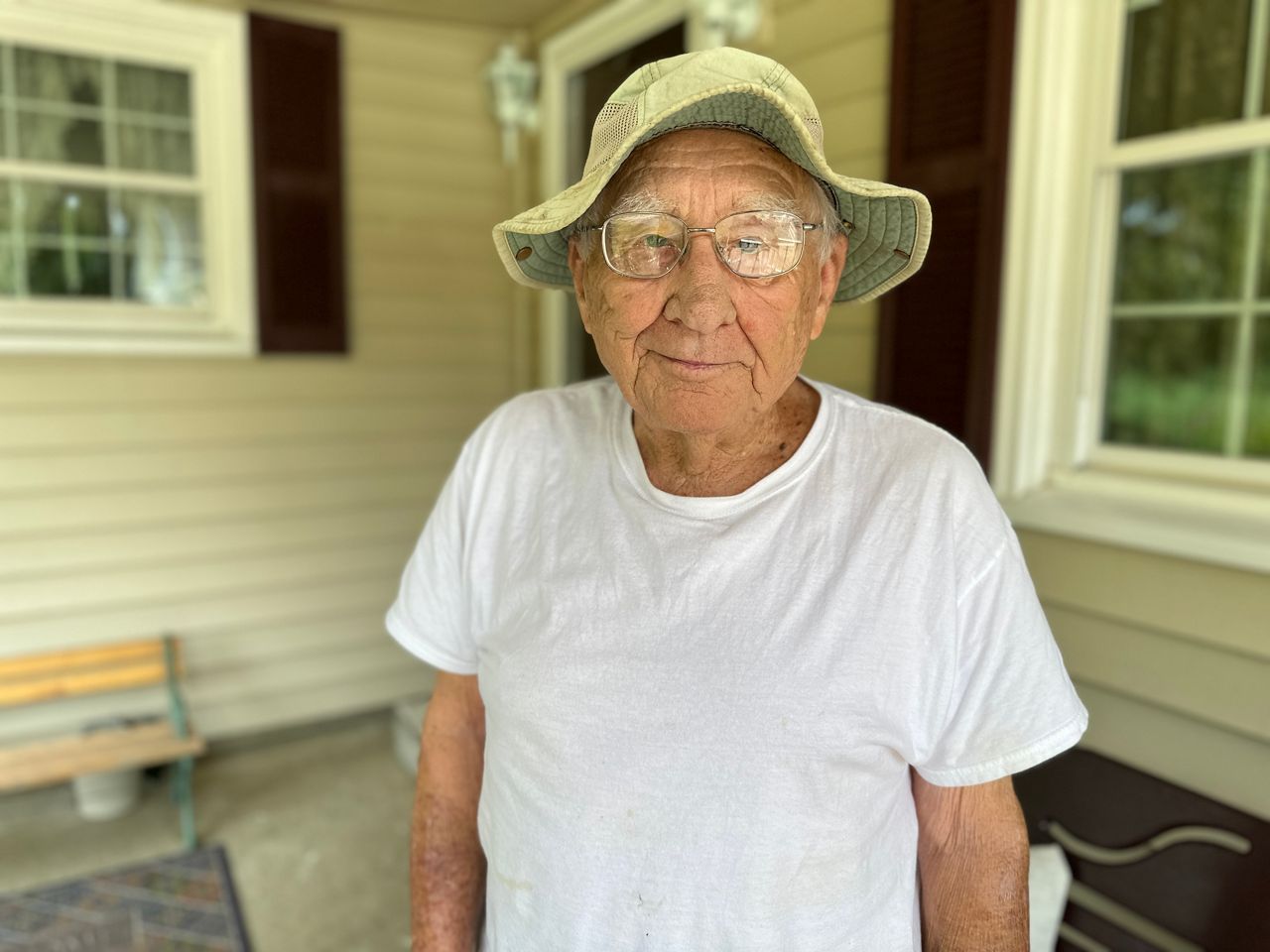ALEXANDRIA, Ohio — On a once very quiet, country road in Alexandria lives John Byrd, 93. He’s lived in the village his whole life and said he’s watching his town be turned into a “sacrifice zone.”
“You might call it dump truck alley,” Byrd said. “Some days are a lot worse than others.”
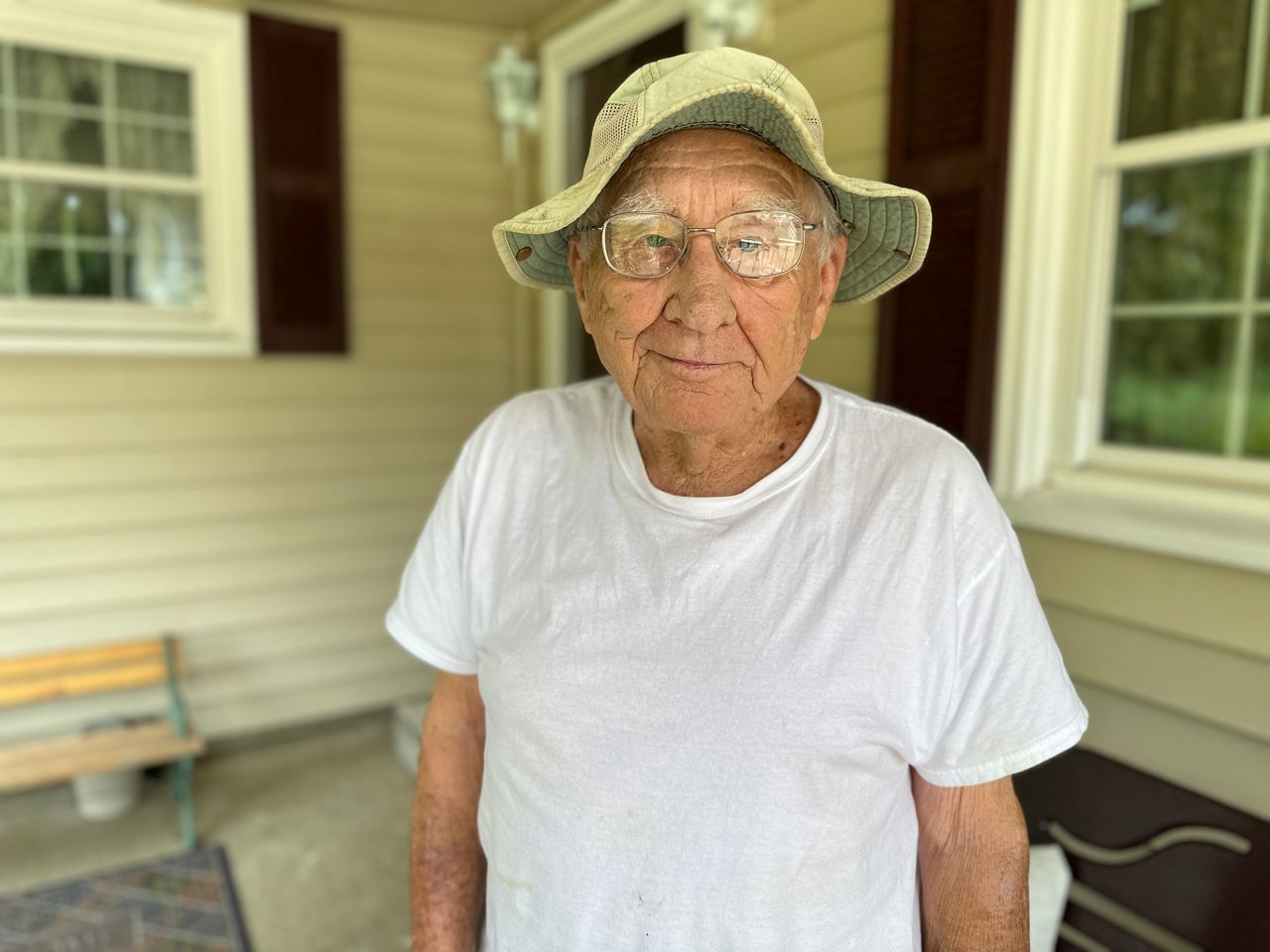
John Byrd, a resident of Alexandria. (Spectrum News 1/Taylor Bruck)
Just miles away from Alexandria is New Albany where Intel and other huge companies are setting roots, bringing massive development, along with thousands of people to the state.
Truck after truck after truck comes through Alexandria each day, which is home to industries like concrete, sand and gravel plants.
“It is all day long,” said Stephanie Taylor, a resident of Alexandria. “You’re getting hit in the face with debris.”
Two proposed asphalt plants on both sides of town would add even more. Scioto Materials, a division of The Shelly Company, is proposing a plant on the southeast side of the village and a spokesperson for the Ohio EPA said the agency has a request from Mar-Zane Materials, a Shelly & Sands affiliate, to move a portable asphalt plant to the Martin Trucking property, which is on the northwest side of town. Both asphalt plants would add to the already existing industry.
Byrd lives just one house down from Martin Trucking.
“I just hate to see it,” Byrd said. “I hate to see it for our neighbors, too.”
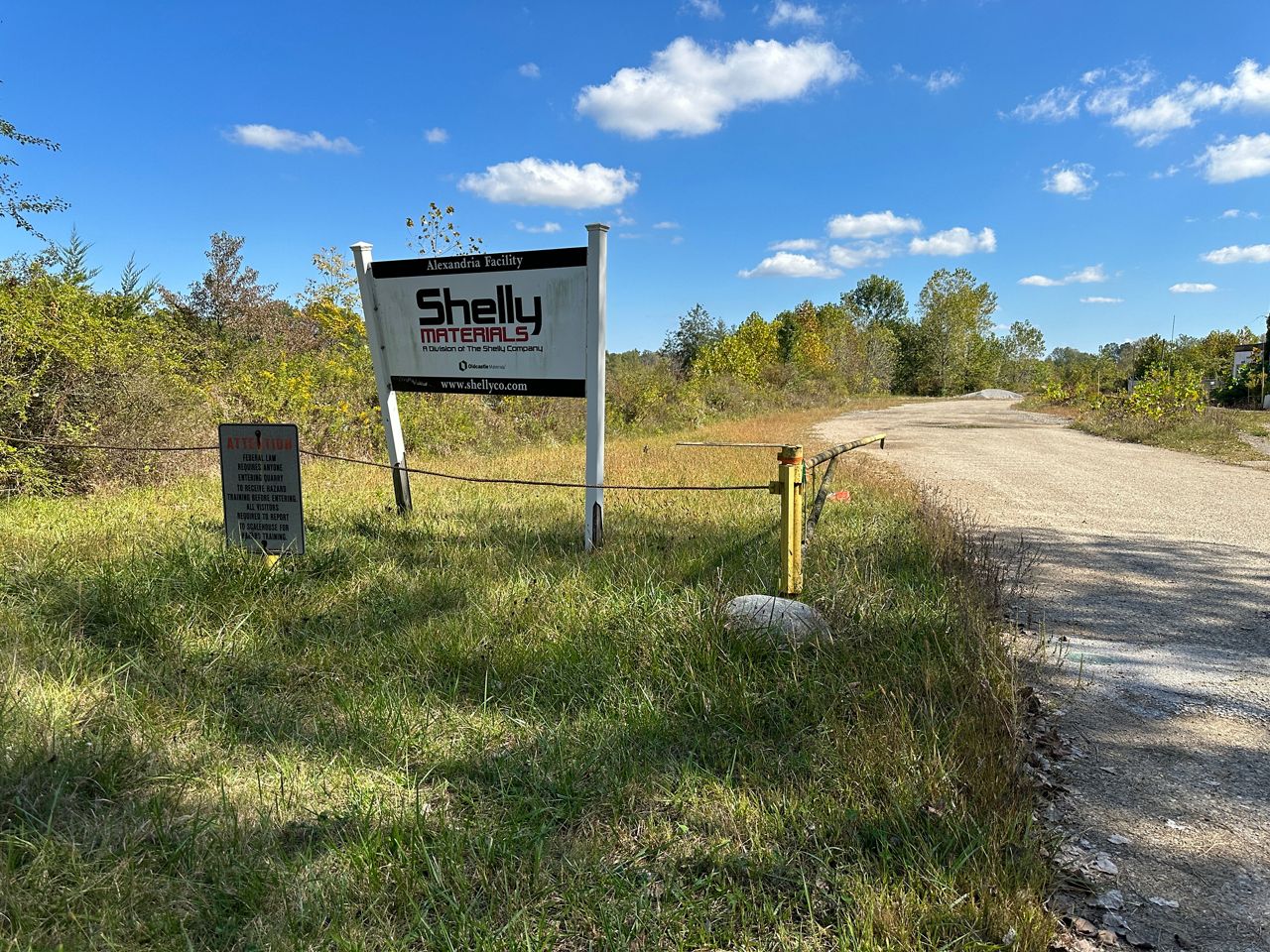
Scioto Materials, a division of The Shelly Company, is proposing a plant on the southeast side of the village where Shelly Materials has a facility. (Spectrum News 1/Taylor Bruck)
Ken Apacki, a data scientist and resident of Granville who worked for Owens Corning for 18 years ran the numbers and said the proposed asphalt plants would bring in thousands more trucks each day.
“At the one plant, it’s like 1,500 trucks a day and you add the second plant that’s almost the same size it’d be doubling it. I’ve got 3,000 trucks a day, coming through the area,” Apacki said.
Many residents of Alexandria, including Stephanie Taylor and Julia King, are concerned about their community’s air quality, drinking water and quality of life.
“I feel disparaged,” Taylor said. “Because we don’t necessarily have the income that say New Albany has, it is very easy to say, this is the location we’re gonna put it.”
The proposed plants would bookend the town with emissions.
“We’re fearful of all the toxins in the air,” King said. “It could cause all kinds of breathing issues, lung issues, cancer, you know, lord knows what else it could be causing.”
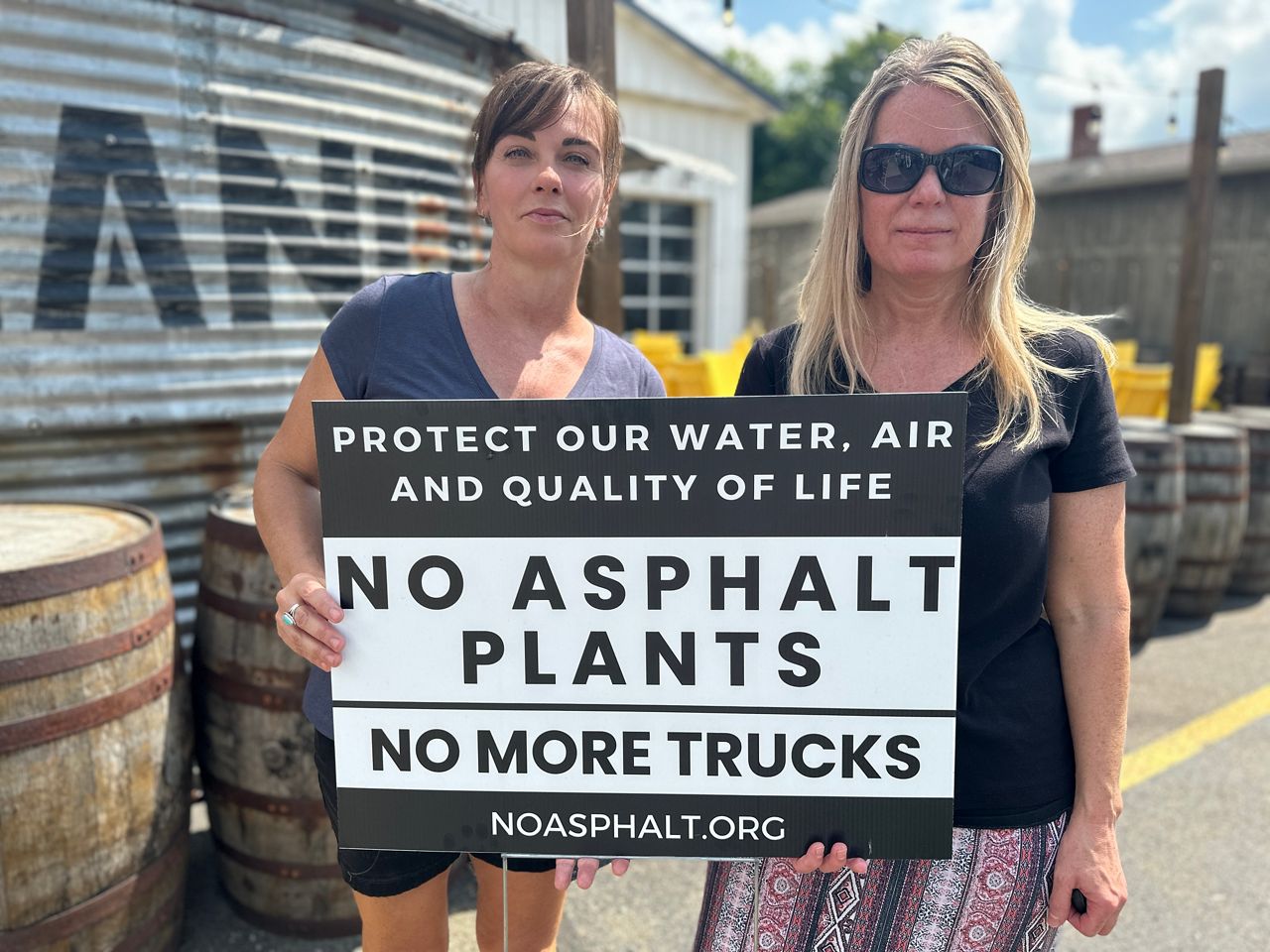
Stephanie Taylor (left) and Julia King (right) hold a sign that says “no asphalt plants.” (Spectrum News 1/Taylor Bruck)
They said the town is becoming unlivable. Many residents have taken action and lined the streets with signs that say “no asphalt plants.” They’ve attended township meetings and formed the grassroots organization “Clean Air & Water for Licking County.”
The village of Alexandria is only about a mile long from end to end and is home to roughly 500 people, but Taylor said the negative effects these asphalt plants could have on the region could affect thousands. Taylor said many residents are worried potential run-off from the proposed plants could contaminate the region’s drinking water supply not just for Alexandria, but the cities of Granville and Newark as well. Both proposed sites sit on a floodplain and are located close to Raccoon Creek, one of Ohio’s largest streams.

Part of Raccoon Creek, one of Ohio’s largest streams. (Spectrum News 1/Taylor Bruck)
“It takes very, very little oil to infiltrate a water supply and ruin it and oil petroleum is not the only thing involved in a hot mix asphalt plant,” Taylor said. “We have all seen what’s happened in Flint, Michigan with their water. We have all seen what happened in East Palestine. Those things can and will happen here, if not for citizen involvement. So many people think that the Environmental Protection Agency and the government entities are here to make sure that those things don’t happen. I implore you to look that up for yourself and who you will find is actually protecting you, are citizen’s grassroots projects, every single time, it is not the EPA, they might as well go ahead and call them the CPA, the corporate protections agency.”
At a public hearing on June 8th, the Ohio EPA spoke to residents about the proposals. Amy Klei, the Chief of the EPA Division of Drinking and Ground Waters, stated she doesn’t expect effects from surface and ground waters because of a 20-30 foot clay layer under the soil.
Tod Frolking, a geologist, soil expert and retired professor at Denison University, disputes that finding. He’s studied the area for more than 30 years and said it’s full of gravel and soil.
“So if you go looking at a number of records around here, you’ll see that many of them have different materials,” Frolking said. “There is no continuous layer of fine silt and clay at any particular depth.”
He warned that almost any other location is better than what has been proposed.
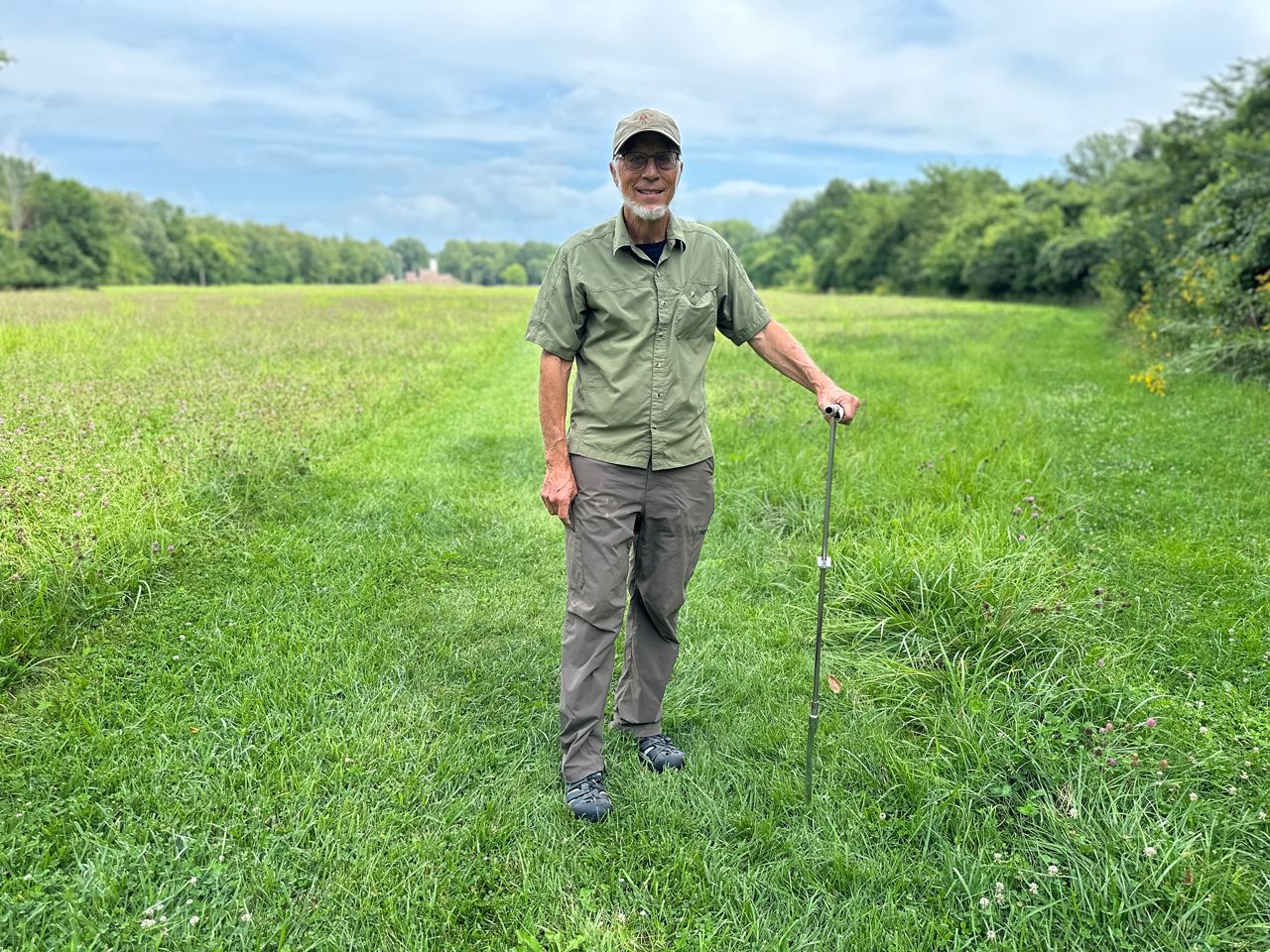
Tod Frolking, a geologist, soil expert and retired professor at Denison University. (Spectrum News 1/Taylor Bruck)
“When operations get busy, stuff happens and you’re relying on every truck driver, every person participating to be careful,” Frolking said.
Local leaders are hearing the concerns of residents and environmentalists and speaking out including Melissa Hartfield, the Mayor of Granville.
“The easy thing for them to do is find another location, and I just am baffled that this is their choice,” Hartfield said. “Who’s in charge of this state? Who are the leaders? The leaders are the ones that are supposed to go out and say, no, you’re gonna fix this, no, you’re gonna make this right for these people. You know, we have to say this is not acceptable for the residents here in this county.”
Granville is located not even five miles from Alexandria, so the Village of Granville and Denison University are taking legal action.
“This could have a generational impact,” Hartfield said. “You tell me after your water supply is poisoned, who wants to take a shower? Who wants to brush their teeth? Who wants to mix it with their baby’s formula? Nobody.”
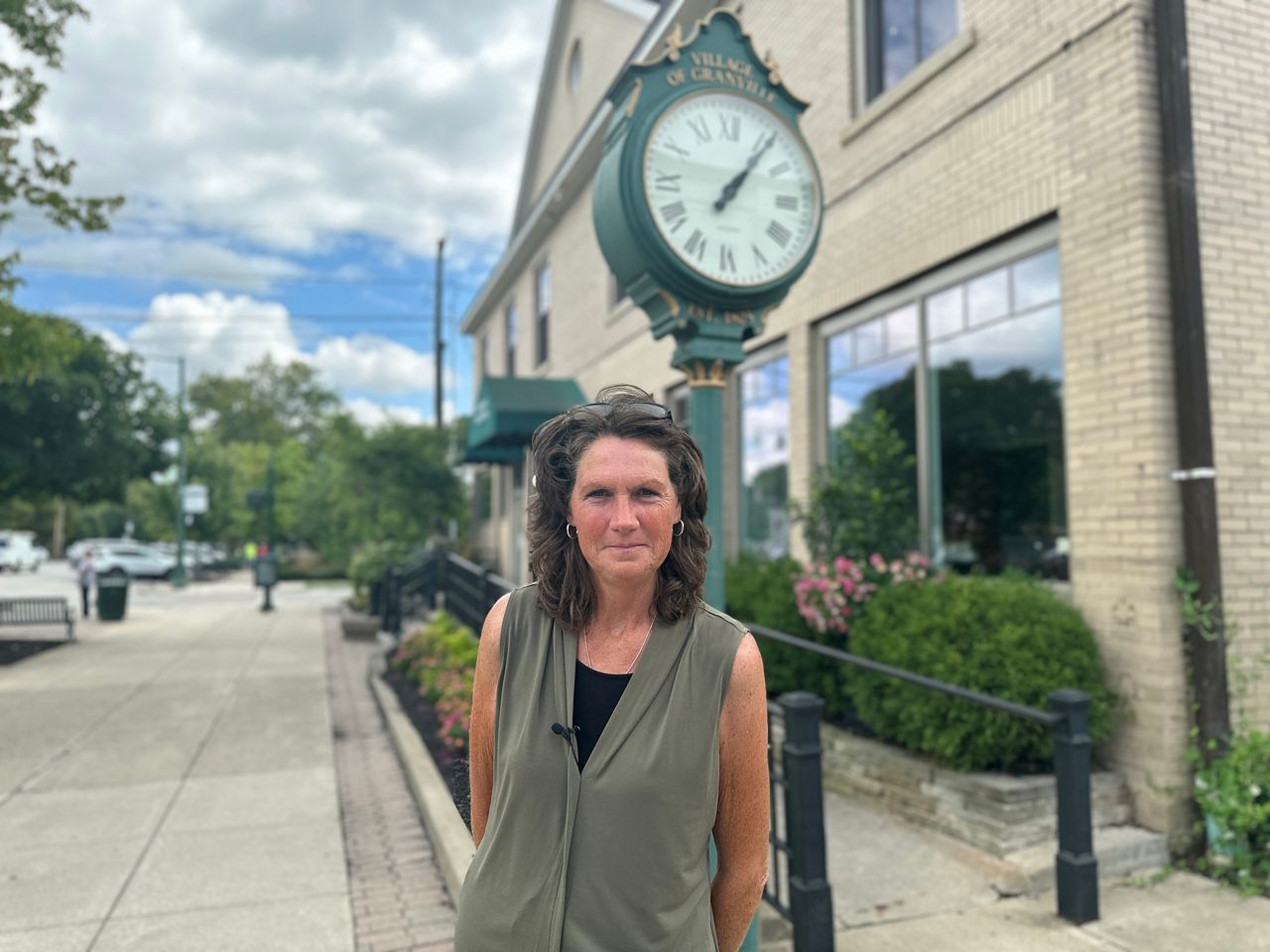
Melissa Hartfield, the mayor of Granville. (Spectrum News 1/Taylor Bruck)
Taylor said they want to be clear that the residents of Alexandria are not anti-industry, anti-asphalt or anti-development, they’re anti-the specific proposed locations.
“We understand as a community the need for asphalt, we understand the growth that’s coming, we understand that the trucks are necessary,” Taylor said. “We’re not anti-industry, we’re not anti-growth, we’re certainly not anti-trucker by any means. But what we’re asking is, is this the best location as you stand here in this small town, is there not a better way? Is there not a better location for, you know, for these sites?”
Residents are urging government entities to help them. Scioto Materials is currently seeking an air permit from the Ohio EPA all while trying to re-write a history of non-compliance. The company is currently facing violations such as a floodplain violation and a zoning violation, among others.
“Communities don’t necessarily want any kind of facility in their backyard, I do understand that,” said Anne Vogel, the director of the Ohio EPA. “But again, our job is to be compliant with the federal and state regulations. I think we do a very good job of that, of making sure that we are protective of human health and the environment. We are very careful about applying our regulations conservatively. And we take a lot of public input. We take public input and concern very seriously. And then, at the end of the day, though, we can’t be the one not allowing for any development, right, and not allowing for any job creation, or any growth or the ability for the companies that need materials in Ohio, they need to be able to get it in Ohio. So we definitely have to strike a balance.”

A sign that says “no asphalt plants” in Alexandria, Taylor Bruck/Spectrum News 1
As more development pours into the state, Taylor said no community, no matter how small, should become a sacrifice zone.
“For anybody who might see this and think, well, it’s not my backyard. It really is your backyard,” Taylor said. “There’s a lot coming to Ohio, Central Ohio, in particular, and if we don’t stand together to protect our air and water, which we all share, there could be tragic side effects to that.”
There are many organizations that have to evaluate and approve individual aspects of the proposals, including building permits, air permits and zoning considerations. The Ohio EPA is in the process of reviewing public comments submitted on the draft air permit for Scioto Materials.
A spokesperson for the Ohio EPA said Mar-Zane has not asked the Ohio EPA to end their application to move their equipment to Alexandria. No decision has been made by Ohio EPA on the request.
Scioto Materials plans to appeal its floodplain violation on Oct. 23 at 7 p.m. at the Licking County Administration Building.
Spectrum News reached out to the lawyer representing Scioto Materials, Aaron Underhill, and he said he is unable to speak because of the sensitivity of the issues. Mar-Zane Materials did not reply to multiple requests for comment.
For more information, visit here.

